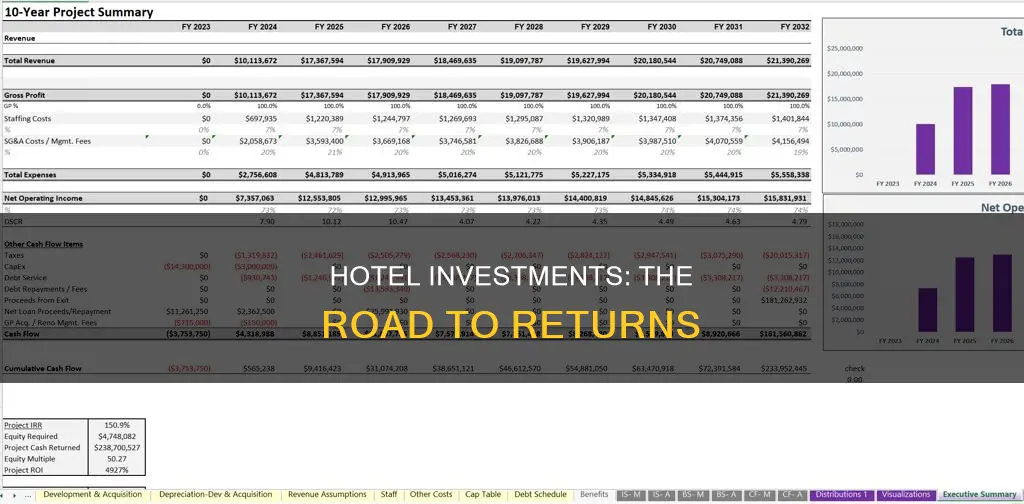
Hotel investments can be a great way to generate income, but they come with their own set of challenges and risks. The success of a hotel investment depends on various factors, including location, management, market demand, and economic conditions.
Hotel investments offer the potential for lucrative returns through room bookings, F&B sales, and events, but they also carry a higher level of risk compared to other types of investments. The COVID-19 pandemic significantly impacted the hotel industry, but it has shown remarkable resilience and is expected to generate $1.21 trillion in 2024.
So, do hotel investments pay out? The answer is, it depends. A well-managed hotel in a desirable location with a dedicated staff can provide stable cash flow and substantial returns. However, economic downturns, competition, and operational issues can also affect profitability.
| Characteristics | Values |
|---|---|
| Definition of hotel investment | Investing in a hotel to make a return on investment (ROI) |
| Types of hotel investments | Shares, assets, part of a hotel, or an entire property |
| Hotel industry overview | Leading lodging industry, offering services like spas, luxury suites, fine dining restaurants, and resorts |
| Benefits of investing in hotels | Stable cash flow, potential for property value appreciation, tax benefits, diversification of investment portfolio |
| Factors to consider when investing in hotels | Location, management and operations, market demand and competition, financing options, industry trends and changes |
| Risks and challenges of hotel investment | Seasonality and occupancy rates, economic downturns, competition and market changes, labor costs and management issues, maintenance and upkeep costs |
| Performance metrics | Average daily rate (ADR), revenue per available room (RevPAR), gross operating profit per available room |
| Advantages of being a hotel investor | High potential returns, cost segregation options, tax benefits, diversification of investment portfolio, ability to enjoy hotel facilities |
| Disadvantages of being a hotel investor | Dependence on economy, competition, and location, risk of over-leveraged capital, reliance on effective management and operations, reliance on people and culture |
What You'll Learn

High-risk, high-reward
Hotel investments are considered a high-risk, high-reward endeavour. While there are many benefits to investing in hotels, there are also several factors that contribute to the high level of risk involved. Understanding these risks and rewards can help potential investors make informed decisions about whether to invest in the hotel industry.
Risks
One of the main risks associated with hotel investments is their dependence on economic stability, market competition, and location. Hotels are highly dependent on guest bookings, and economic downturns or recessions can significantly impact the number of people travelling and booking hotel rooms. Additionally, the success of a hotel is closely tied to its location, with hotels in popular areas or close to city centres typically generating higher revenue. Competition from other hotels can also affect a hotel's performance, as guests may be drawn to newer or more affordable options.
Another risk is the potential for over-leveraged capital. Hotel investors may be tempted to borrow large amounts of money to increase their potential returns, but this can lead to financial strain if the hotel is unable to cover debt repayments, interest payments, and operating expenses. Management and operational issues can also impact the success of a hotel investment, as effective management and efficient operations are crucial for a hotel to thrive.
Rewards
Hotels offer the potential for high returns on investment through room bookings, food and beverage sales, and events. They provide a stable cash flow and can be a valuable real estate asset, especially in high-demand areas. Hotels also offer tax benefits to owners, such as depreciation deductions and opportunity zone incentives, which can optimise returns.
Investing in hotels can also provide diversification to an investment portfolio, as hotel performance is often disconnected from stock market and other real estate trends. Additionally, investors can enjoy the hotel amenities and perks themselves, making it a rewarding experience beyond just financial gains.
Mitigating Risks
While there are risks involved in hotel investments, there are also strategies to mitigate these risks. For example, conducting thorough market research and choosing a prime location can help attract guests and reduce the impact of competition. Working with an experienced hotel management team can improve operations and enhance the guest experience, which is crucial for positive reviews and repeat business.
In conclusion, hotel investments offer a high-risk, high-reward opportunity. By understanding the risks and rewards and implementing effective strategies, investors can increase their chances of success in the hotel industry.
Where to Invest Your Money
You may want to see also

Tax benefits
Investing in hotels can offer several tax benefits that can help investors reduce their tax liabilities and increase their returns. Here are some of the tax benefits associated with investing in hotels:
Depreciation
Hotels are considered commercial properties and are subject to depreciation, which allows investors to deduct a portion of the property's value each year. This deduction can help offset the income generated by the hotel property, reducing the investor's taxable income.
Interest Deductions
Investors can deduct the interest paid on any loans used to purchase or improve the hotel property. This deduction can significantly reduce the investor's tax liability.
Tax-Deferred Exchanges
Investors can defer paying taxes on the sale of a hotel property by using the proceeds to purchase another like-kind property. This strategy can help investors avoid capital gains taxes and increase their overall return on investment.
Cost Segregation
Cost segregation is a process that allows investors to separate and allocate the costs of certain building components into shorter depreciable lives than the building itself. In the case of hotels, cost segregation can be particularly beneficial because hotels typically have a lot of specialised equipment and furnishings with shorter depreciable lives than the building itself. By depreciating these components over shorter lives, investors can reduce their tax liability and increase their cash flow.
Capital Investment Allowances
Capital investment allowances are tax benefits designed especially for hotel ownership. These benefits reduce the cost of taxable income as well as the amount of tax to be paid for fittings, fixtures, and furniture.
Structures and Buildings Allowance
This allowance is another tax benefit available to hotel investors, providing deductions on certain building components.
Annual Investment Allowance
The annual investment allowance provides further tax incentives for hotel investors, offering deductions on investments made within a specific time frame.
Equity Growth
Equity growth is among the most significant tax benefits for hotel investors, especially regarding investment recapitalisation. It allows investors to acquire cash equity from a debt refinance without incurring income tax.
Stamp Duty Exemptions
In many parts of the world, hotel investments are exempt from stamp duty if the investment is under a certain amount, making hotels more affordable than other property types.
Savings Strategies: Where to Invest Right Now
You may want to see also

Diversification
Diversifying your investment portfolio is a smart financial strategy, and hotel investments are a great way to achieve that. Here's why diversification is important and how hotels can help:
Mitigating Risk
Hotel Investments Offer Multiple Benefits
Hotels provide a steady income stream through room bookings and services. They are also a form of real estate investment, which can act as a hedge against inflation and offer tangible assets. Additionally, hotel investments can provide passive income streams, especially if you invest in a well-managed hotel with a strong brand and location.
Types of Hotel Investments
There are several ways to invest in hotels:
- Direct Ownership: You can buy and operate a hotel property independently, but this option requires significant capital and expertise.
- Fractional Ownership: This option allows you to invest in a portion of a hotel property with other investors, reducing the initial investment cost.
- Hotel Development Funds: You can invest in funds specifically focused on hotel development projects, diversifying your investment across multiple hotel ventures.
- Real Estate Investment Trusts (REITs): REITs are companies that own and operate hotels, and investing in them provides exposure to the hotel industry without the need to directly manage a property.
Factors to Consider
When selecting a hotel investment, carefully research the location, considering tourist demand, the local economy, and competition. Choose between boutique hotels, luxury resorts, or budget accommodations based on your investment goals and risk tolerance. Assess the financial performance and potential returns, and don't underestimate the importance of a competent hotel management team.
Managing Hotel Investments
To effectively manage your hotel investments:
- Consider hiring a professional hotel management company to handle day-to-day operations.
- Regularly monitor financial performance and occupancy rates to make data-driven decisions.
- Invest in property maintenance and renovations to maintain the hotel's appeal and functionality.
- Implement effective marketing strategies to attract guests and increase occupancy rates.
In conclusion, hotel investments offer a compelling opportunity to diversify your portfolio, generate steady income, and benefit from the growth in the travel and hospitality industry. By carefully selecting and managing your hotel investments, you can navigate the risks and reap the rewards of this exciting investment avenue.
Coca-Cola: A Refreshing Investment
You may want to see also

Management
The success of a hotel investment depends on effective management and operations. A hotel's service quality and strategic decision-making are crucial to its performance, and a great management team is essential to achieving this.
A hotel investment can be managed in several ways, depending on the investor's preferences and level of involvement. Here are some common management options:
- Owner-operator model: The investor owns the hotel and is actively involved in its day-to-day operations. This model is suitable for those with a hospitality degree or hands-on approach.
- Management contract: The investor hires a hospitality management company to run the hotel on their behalf. This option is ideal for those who want to invest without daily operations involvement.
- Franchise agreement: The investor becomes a franchisee, hiring a team to manage the hotel. This may appeal to those with experience managing teams.
- Real estate investment trusts (REITs): This option is for investors with multiple hotel properties who have set up their own business.
The choice of management style will depend on the investor's expertise, availability, and desire for involvement in the hotel's operations. Effective management is key to the success of a hotel investment, so it is important to make an informed decision and select a reputable and experienced management company if needed.
Additionally, technology plays a significant role in hotel management. Investing in the latest hotel technology can enhance the guest experience and streamline operations. This includes software for reservations, revenue management, and marketing.
Another critical aspect of management is the focus on broader industry trends. It is essential to stay up-to-date with industry developments and invest in new strategies to remain competitive. For example, during the COVID-19 pandemic, hotels adapted by implementing enhanced cleaning measures, creating attractive packages, and reimagining existing spaces to accommodate social distancing.
Furthermore, management should also focus on enhancing the guest experience and building customer loyalty. This can be achieved through excellent service, a guest-centric culture, and a commitment to meeting guest needs and expectations.
Finally, labour and staffing are essential considerations. As hotels require a significant number of employees, labour costs can be high, and conflicts may arise. It is crucial to have a dedicated and well-managed staff to ensure smooth operations and guest satisfaction.
EPZ Investments: Why People Take the Risk
You may want to see also

Location
The success of a hotel investment depends on several factors, and one of the most important is its location. The popularity of a hotel is often influenced by its proximity to venues such as hospitals, arenas, and office buildings. Being situated in an attractive market that appeals to both business and leisure travellers is ideal. It is also beneficial to consider the ease of access to and from the location.
The location of a hotel can impact its demand and, consequently, its revenue. Hotels in established tourist hotspots tend to be more popular, but even these destinations can experience fluctuations in popularity beyond the owner's control. Additionally, the emergence of local competitors or improvements to their offerings may divert guests away from your hotel.
The impact of location on hotel investments was evident during the COVID-19 pandemic, which saw travel restrictions and a decline in occupancy rates. The financial strain on the hospitality industry during this period presented investment opportunities for those seeking to capitalise on quality properties in the right areas.
When considering a hotel investment, it is crucial to evaluate the location and its potential to drive demand. A strategic location can enhance the success of the investment, while a less favourable location may hinder it.
Invest Now: Hot Trends
You may want to see also
Frequently asked questions
Hotel investments can provide a stable cash flow and a diverse investment portfolio. They can also be a good way to take advantage of tax benefits and generate high returns.
The success of a hotel investment depends on various factors, including the economy, competition, location, management, and operations. There is also a risk of over-leveraged capital, where debt mounts and the hotel becomes unable to cover its expenses.
Investing in a hotel can be a great opportunity, especially if you are passionate about the travel industry. However, it is important to consider all your options, review the challenges, and ensure you are able to meet them. It is also crucial to have a clear understanding of the hotel industry and the specific investment opportunities available, such as crowdfunding or outright purchases.







